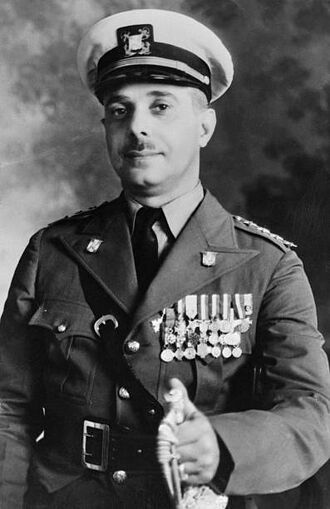
|
| “ | He who does not know how to deceive does not know how to rule. | „ |
| ~ Rafael Trujillo |
Rafael Leonidas Trujillo Molina (October 24, 1891 – May 30, 1961), nicknamed El Jefe (The Chief or The Boss), served as dictator of the the Dominican Republic from 1930 until his assassination in 1961. He officially served as president from 1930 to 1938 and again from 1942 to 1952, otherwise ruling as an unelected military strongman.
Biography edit
Early years edit
Rafael Leonidas Trujillo Molina was born on 24 October 1891 in San Cristóbal, Dominican Republic, into a lower-middle-class family. His father was José Trujillo Valdez, the son of Silveria Valdez Méndez of colonial Dominican origin and José Trujillo Monagas, a Spanish sergeant who arrived in Santo Domingo as a member of the Spanish reinforcement troops during the annexation era. Trujillo's mother was Altagracia Julia Molina Chevalier, later known as Mama Julia, the daughter of Pedro Molina Peña, also of colonial Dominican origin, and the teacher Luisa Erciná Chevalier, whose parents were part of the remaining French descendants in Haiti: Trujillo's maternal great-grandfather, Justin Víctor Turenne Carrié Blaise, was of French descent, while his maternal great-grandmother, Eleonore Juliette Chevallier Moreau, was part of Haiti's mulatto class. Trujillo was the third of eleven children; he also had an adopted brother, Luis Rafael "Nene" Trujillo (21 January 1935 – 14 August 2005), who was raised in the home of Trujillo Molina.
In 1897, at the age of six, Trujillo was registered in the school of Juan Hilario Meriño. One year later, he transferred to the school of Broughton, where he became a pupil of Eugenio María de Hostos and remained there for the rest of his primary schooling. At the age of 16, Trujillo got a job as a telegraph operator, which he held for about three years. Shortly after Trujillo turned to crime: cattle stealing, check counterfeiting, and postal robbery. He spent several months in prison, which did not deter him, as he later formed a violent gang of robbers called the 42.
In 1916, the United States occupied the Dominican Republic, which had threatened to default on foreign debts. The occupying force soon established a Dominican army constabulary to impose order. Trujillo joined the National Guard in 1918 and trained with the US Marines. Seeing an opportunity, Trujillo impressed the recruiters and won promotion from cadet to general and commander-in-chief of the Army in only nine years.
A rebellion or coup d'état against Dominican President Horacio Vásquez broke out in February 1930 in Santiago. Trujillo secretly cut a deal with the rebel leader Rafael Estrella Ureña. In return for Trujillo letting Estrella take power, Estrella would allow Trujillo to run for president in new elections.
As the rebels marched toward Santo Domingo, Vásquez ordered Trujillo to suppress them. However, feigning "neutrality," Trujillo kept his men in barracks, allowing Estrella's rebels to take the capital virtually unopposed. On 3 March, Estrella was proclaimed acting president, with Trujillo confirmed as head of the police and of the army. As per their agreement, Trujillo became the presidential nominee of the Patriotic Coalition of Citizens (Spanish: Coalición patriotica de los ciudadanos), with Estrella as his running mate. The other candidates became targets of harassment by the army. When it became apparent that the army would allow only Trujillo to campaign unhindered, the other candidates pulled out.
Ultimately, the Trujillo-Estrella ticket was proclaimed victorious with an implausible 99 percent of the vote. In a note to the State Department, American ambassador Charles Boyd Curtis wrote that Trujillo received far more votes than actual voters.
In power edit
Trujillo's 30 years in power, to Dominicans known as the Trujillo Era (Spanish: La Era de Trujillo), is considered one of the bloodiest ever in the Americas, as well as a time of a classic personality cult, when monuments to Trujillo were in abundance. It has been estimated that Trujillo's authoritarian rule was responsible for the death of more than 50,000 people, including 20,000 to 30,000 Haitians in the infamous Parsley Massacre.
At the height of his power, Trujillo was one of the richest men in the world, reaching a net worth of $800 million. He was also a rapist, having hundreds of beautiful mulatto girls and various young virgins brought to him for a marathon romp, then sending them off with a few gifts (and sometimes a child). He was also very extravagant; he had thousands of suits, pairs of shoes which would be repeated by Imelda Marcos, and ties, all made of fine, expensive material. He also liked to travel a lot, his favorite trip being to Paris. The nails that kept his mansion together were reportedly made of solid gold.
He was popularly known as "El Jefe" ("The Chief") or "El Benefactor" ("The Benefactor") but was privately referred to as Chapitas ("Bottlecaps") because of his indiscriminate wearing of medals. Dominican children emulated Trujillo by constructing toy medals from bottle caps. He was also known as "El Chivo" ("The Goat").
One of his most infamous acts was his ordering of the brutal murder of the Mirabal Sisters, called Las Mariposas ("the butterflies"), three sisters who vehemently opposed his dictatorship. This was the last and biggest mistake he ever made. Once word of the murder reached outside his country's border, foreign approval/acceptance of his regime all but vanished. It was one of the last murders committed during his reign, as he was assassinated by CIA-backed plotters mere months later.
